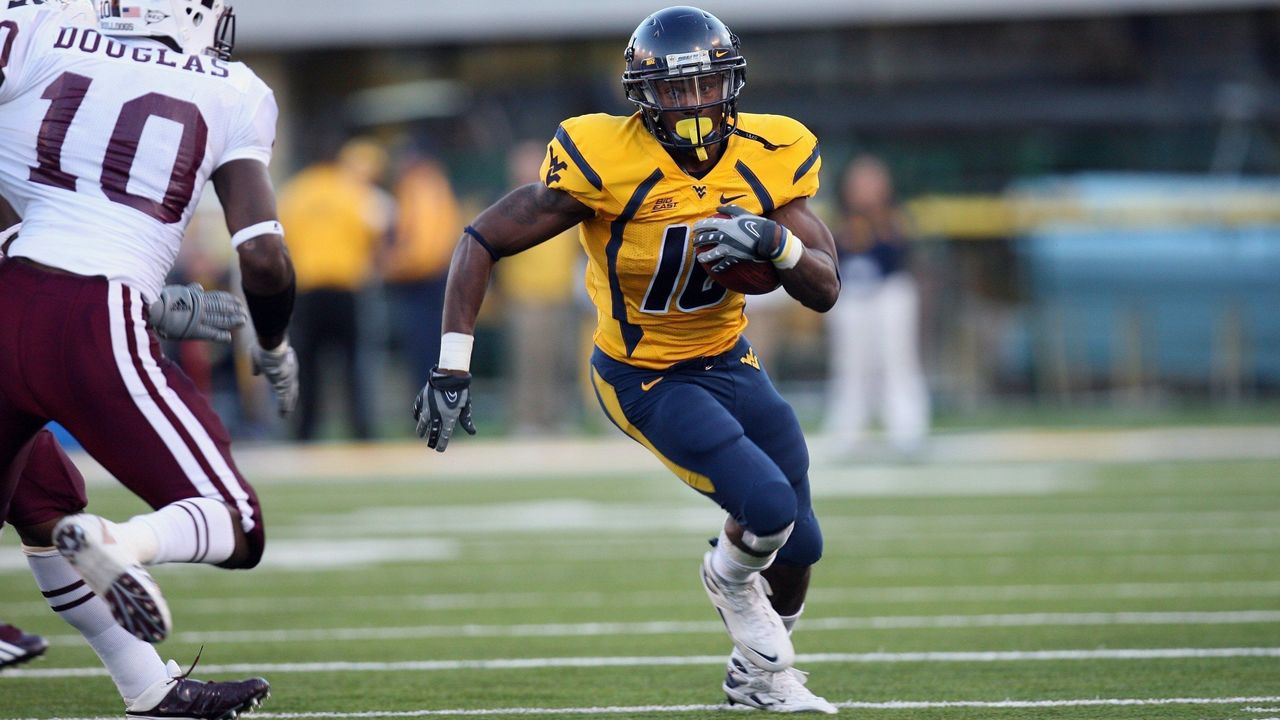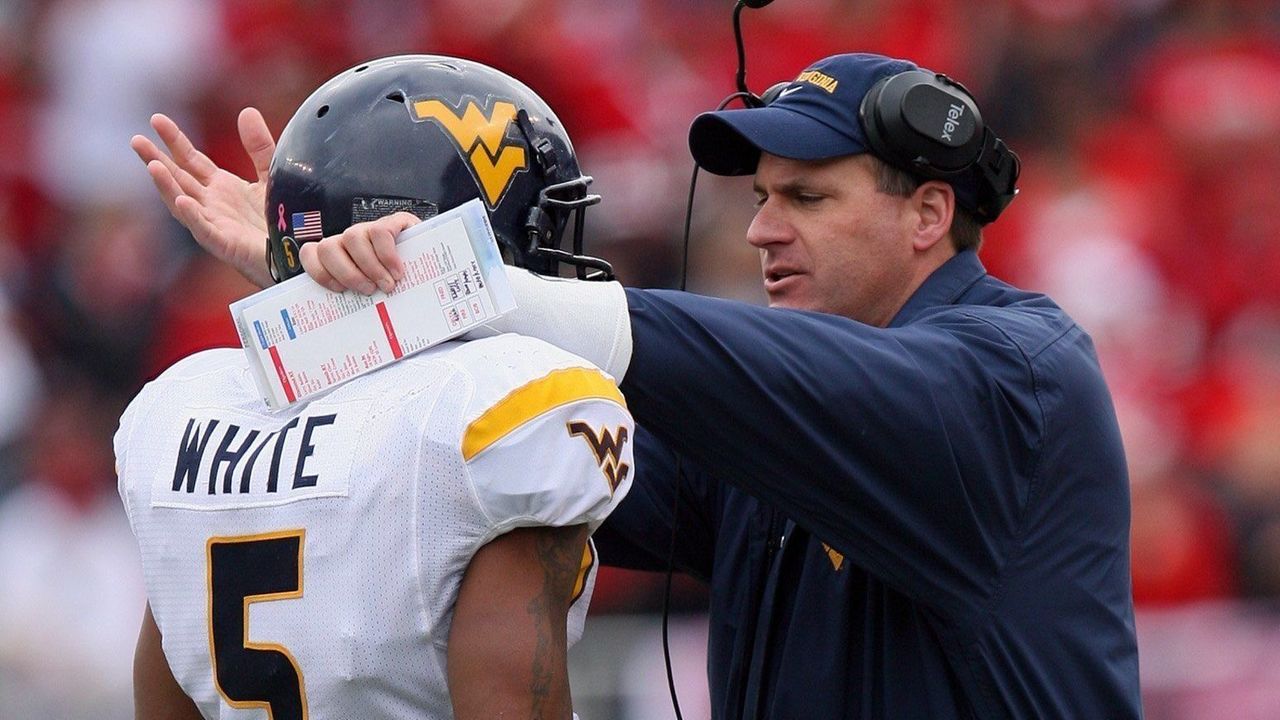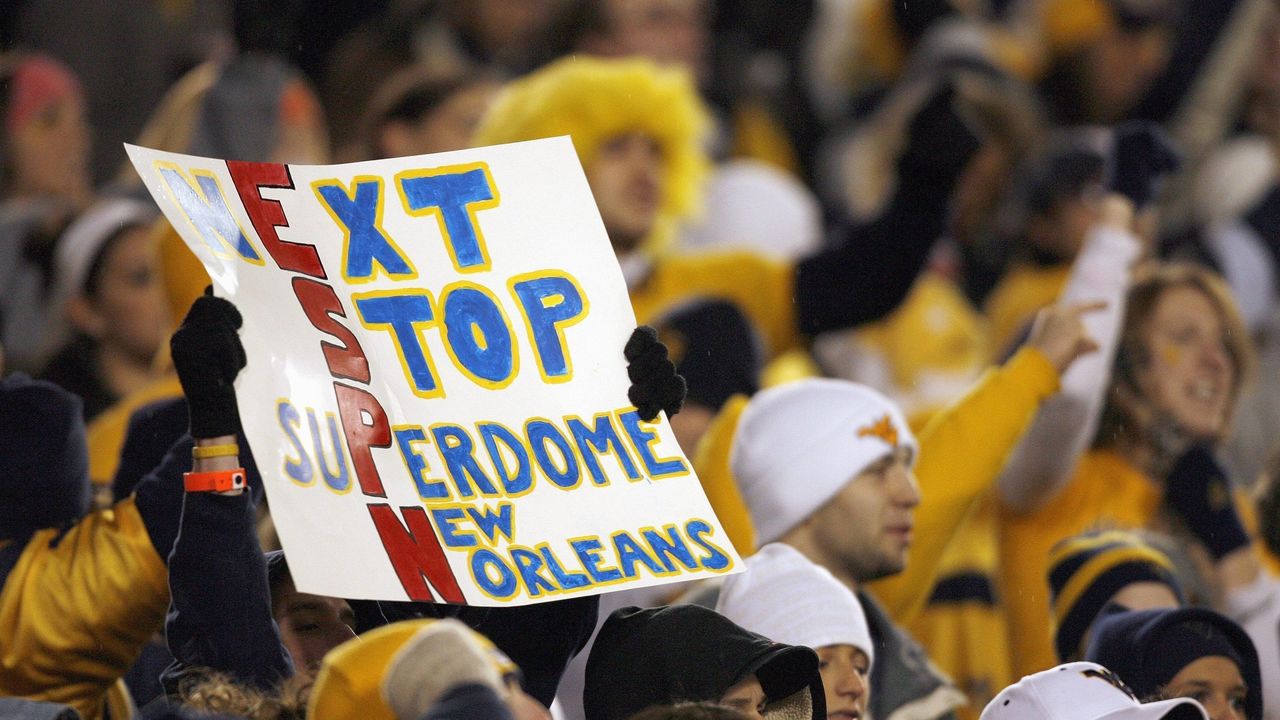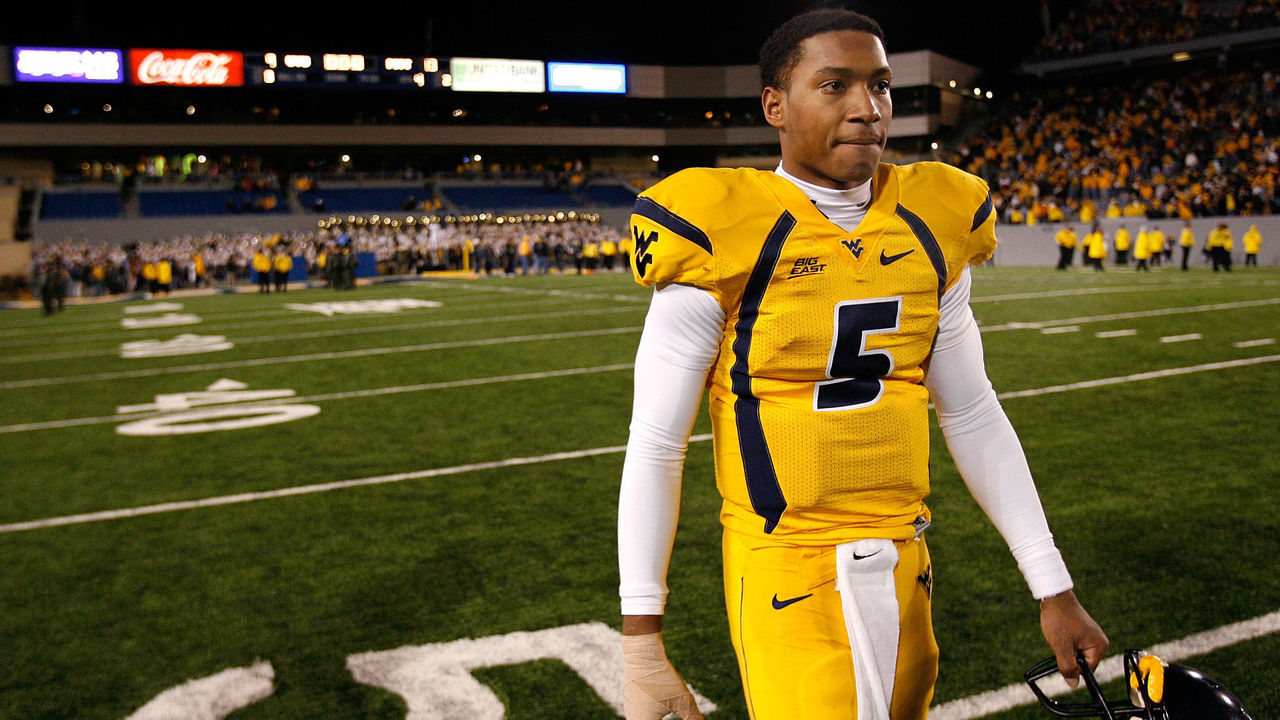Almost Famous: 2007 West Virginia brought the thrill and the heartbreak
Sports history is littered with great teams that dominated their regular seasons only to fall short of ultimate glory. Our writers are paying tribute to those teams who were Almost Famous. After tackling MLB, NFL, NBA and the NHL in the 1970s and in the 1990s, college football is up next.
There are a couple issues with simply choosing the best college football team to not win a national championship. The first is that, until the creation of the Bowl Championship Series, there was no one way to decide a national champion. That's why both Miami (Fla.) and Washington can claim the 1991 national title. The Hurricanes were Associated Press champions. The Huskies were Coaches' Poll champions. Not even the advent of the College Football Playoff has stopped this practice completely - the undefeated 2017 UCF Knights held a national-title parade after Alabama won the playoff.
The second issue: some of the very best teams that didn't win the title actually did - in a different season. The 2005 USC Trojans, who lost to Texas in arguably the greatest national championship game of our lifetime, romped to a title the year before. The 2002 Miami Hurricanes are a similar story.
So for the sake of finding a team that was talented, intriguing, and almost became legendary, I limited my choices to great seasons from programs that haven't won a national title. With honorable mentions to the 1999 Virginia Tech Hokies, 2011 Oklahoma State Cowboys, and 2014 Oregon Ducks, no season combined the flashy, the fun, and - ultimately - the catastrophic quite like the 2007 West Virginia Mountaineers.
For fans of a certain age, the 2007 Mountaineers are iconic. That's thanks in large part to NCAA Football 08 - the video game where West Virginia was a cheat code.
The Mountaineers featured Pat White, a speedy lefty quarterback who was drafted by the Anaheim Angels in the fourth round of the 2004 MLB draft. In 2006, White passed for 1,655 yards and ran for 1,219, leading WVU to an 11-2 record.

At running back was Steve Slaton, a former track runner who posted back-to-back 1,000-yard seasons in 2005 and 2006. The speed and options West Virginia presented in the video game made it unstoppable. The Mountaineers' offense was nearly impossible to stop in real life, too.
West Virginia finished 2005 and 2006 ranked in the top 10. Entering 2007, the supporting cast was strong. Slaton's backup, Noel Devine, was a five-star freshman and the No. 10 overall player in his class. White's primary receiving target, Darius Reynaud, was a second-team All-Big East selection the year before. Owen Schmitt, the fullback, went on to a five-year NFL career.
The pieces - and the speed, especially the speed - were a perfect fit for head coach Rich Rodriguez's spread offense. The final rushing stats for 2007 are gaudy: White rushed for 1,335 yards and 14 touchdowns, Slaton tallied 1,051 and 17, Devine collected 627 and six. White threw for 1,724 yards. Reynaud, a 5-foot-9 target who would play some running back in the NFL, caught 64 passes.
The other factor that swung heavily in West Virginia's favor: 2007 was a volatile, unpredictable mess of a season. Consider the teams that ranked in the top five of the BCS standings between Oct. 14 and Dec. 2, the final release:
| No. 1 | No. 2 | No. 3 | No. 4 | No. 5 | |
|---|---|---|---|---|---|
| Oct. 14 | Ohio St. | So. Florida | Boston Coll. | LSU | Oklahoma |
| Oct. 21 | Ohio St. | Boston Coll. | LSU | Arizona St. | Oregon |
| Oct. 28 | Ohio St. | Boston Coll. | LSU | Arizona St. | Oregon |
| Nov. 4 | Ohio St. | LSU | Oregon | Kansas | Oklahoma |
| Nov. 11 | LSU | Oregon | Kansas | Oklahoma | Missouri |
| Nov. 18 | LSU | Kansas | West Virginia | Missouri | Ohio St. |
| Nov. 25 | Missouri | West Virginia | Ohio St. | Georgia | Kansas |
| Dec. 2 | Ohio St. | LSU | Va. Tech | Oklahoma | Georgia |
South Florida, Boston College, Arizona State, and Kansas all appeared to be title contenders at one time or another. The 2007 national championship was there for the taking. West Virginia let it slip away.
The Mountaineers, ranked No. 3 in the preseason AP poll, shredded a weak nonconference schedule, outscoring Western Michigan, Marshall, Maryland, and East Carolina by a combined score of 189-68. The ground game was simply machine-like. West Virginia eclipsed 300 rushing yards in each of those four games, piling up 1,428 yards - averaging 7.2 yards per touch - and 20 rushing touchdowns.
"We played a Top 5 team in the country and they had a point to make," East Carolina coach Skip Holtz said after the Mountaineers walloped his Pirates 48-7.

It all came grinding to a halt, briefly, on Sept. 28, when an upstart South Florida team - one that climbed as high as No. 2 in the polls - held WVU to 188 rushing yards and won 21-13. But that game came with an asterisk. White left the game in the second quarter after taking a helmet to his thigh and didn't return.
With a healthy White, West Virginia wouldn't lose. Seemingly, with all parts healthy, it couldn't lose. It was too fast. The numbers piled up: 251 rushing yards and 55 points against Syracuse. Another 262 and 38 versus Mississippi State.
The first play from scrimmage against Mississippi State epitomized the headache West Virginia created for defenses. White fooled the defense with a fake handoff. There was no time to recover. White was gone - 64 yards.
The Mountaineers stayed in the top 10 of the polls, lurking, waiting for others to fall. West Virginia moved from No. 7 to 6 in mid-November when Ohio State lost - the same week White saved his team with a late touchdown run to defeat Louisville.
Tied at 31-31 with 1:46 remaining and the ball at midfield, White took a shotgun snap in an empty set. He surveyed the field briefly before tucking the football and running. Ten yards into the run, White redirected left to avoid a defender. Then - whoosh - he turned on the jets and sprinted to the end zone.
By Nov. 18, West Virginia was up to third in the BCS rankings, trailing LSU and Kansas. The next week, LSU lost to Arkansas and Kansas lost to Missouri. West Virginia entered the final week of the season ranked second. (Missouri, which beat Kansas, leapfrogged the Mountaineers.)
The only thing that stood in the way of West Virginia and a date in the BCS title game: Pittsburgh. A rival, but also a team that came to Milan Puskar Stadium in Morgantown, West Virginia, with a 4-7 record. The Panthers were 28.5-point underdogs. The Backyard Brawl should have been a backyard mauling.
Instead, it produced a result that will leave West Virginia fans wondering "what if" for eternity.
"It was just a nightmare," Rodriguez said after the game. "The whole thing was a nightmare."

Everything that could go wrong did for the Mountaineers. West Virginia was already struggling to move the football when White dislocated the thumb on his non-throwing hand in the second quarter. His backup, Jarrett Brown, scored a rushing touchdown to give West Virginia a 7-3 halftime lead, but the vaunted WVU offense gained 43 total yards on 21 plays in the second half. Even when White came back for the final two drives of the game, the Mountaineers could not muster a scoring drive. Slaton and Devine combined for 22 yards on 16 carries.
Pittsburgh scored one touchdown - a 1-yard rush by quarterback Pat Bostick - in the third quarter to take a 10-7 lead. It only needed one. LeSean McCoy carried the ball 38 times for 148 yards. West Virginia lost three fumbles. Mountaineers kicker Pat McAfee missed two field goals.
The game ended with Pittsburgh punter Dave Brytus scampering into the back of his own end zone for a clock-killing safety. The Panthers had done the unthinkable: A 13-9 win over a West Virginia team that was 60 minutes from so much more than that.
The Mountaineers, by virtue of Missouri's loss in the Big 12 title game, could have been the No. 1 ranked team in the final BCS standings. West Virginia likely would have played Ohio State in the national championship. The Buckeyes went on to lose to LSU, 38-24, giving head coach Les Miles his one championship ring.
After losing the game, West Virginia lost its coach, Rodriguez, to Michigan. With associate head coach Bill Stewart at the helm, the Mountaineers' offense rolled in the Fiesta Bowl, gaining 349 yards on the ground in a 48-28 win over Oklahoma. But has a bowl game ever felt like more of a consolation prize? The Mountaineers compiled a 33-5 record from 2005-07, but bungled their best chance to claim national superiority.
White returned in 2008, but Slaton, Reynaud, and Rodriguez were gone. The Mountaineers lost two of their first three games to East Carolina and Colorado before rebounding to go 9-4.

In the 12 seasons since 2007, West Virginia hasn't reached the 11-win mark again. The Mountaineers haven't ended a season ranked better than 17th. Twice, in 2012 and 2018, they were in the top 10 in the preseason, only to lose six and four games, respectively. West Virginia's road became tougher when it joined the Big 12 in 2012; the Mountaineers are 0-8 against Oklahoma as conference foes.
For one of the most prestigious football programs without a national championship, the 2007 team had everything. White, Slaton, and company were explosive in an offense made for their skill sets. A historically weird year in college football allowed WVU an early season mulligan. A down year for its nearby rival meant the Backyard Brawl should have been a coronation for a legendary Mountaineers team. Instead, the Mountaineers tripped on the doorstep of the national championship game, leaving a paradoxical legacy - an easy team to root for, a fun team to watch, but a team that squandered a golden opportunity.
Mark Cooper is theScore's NCAA writer.